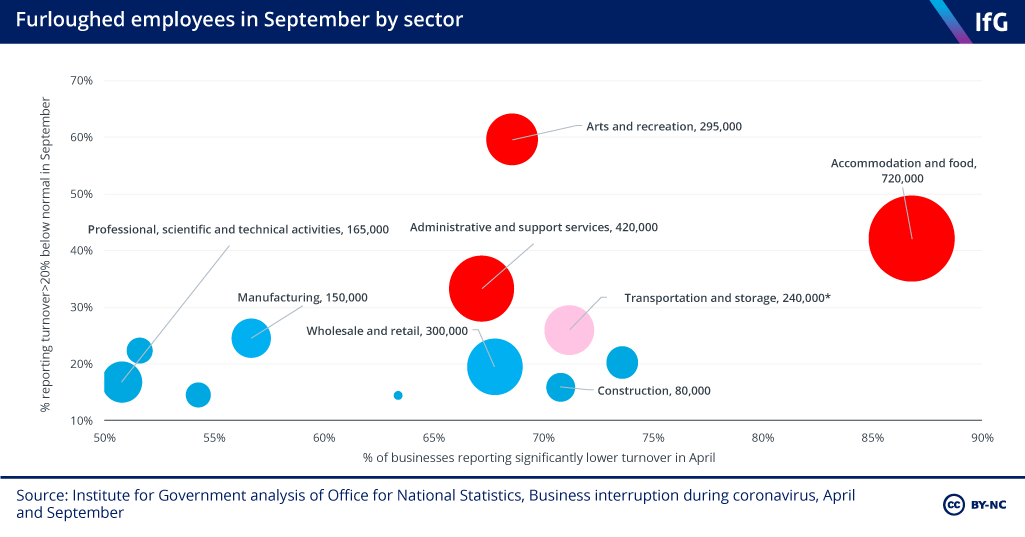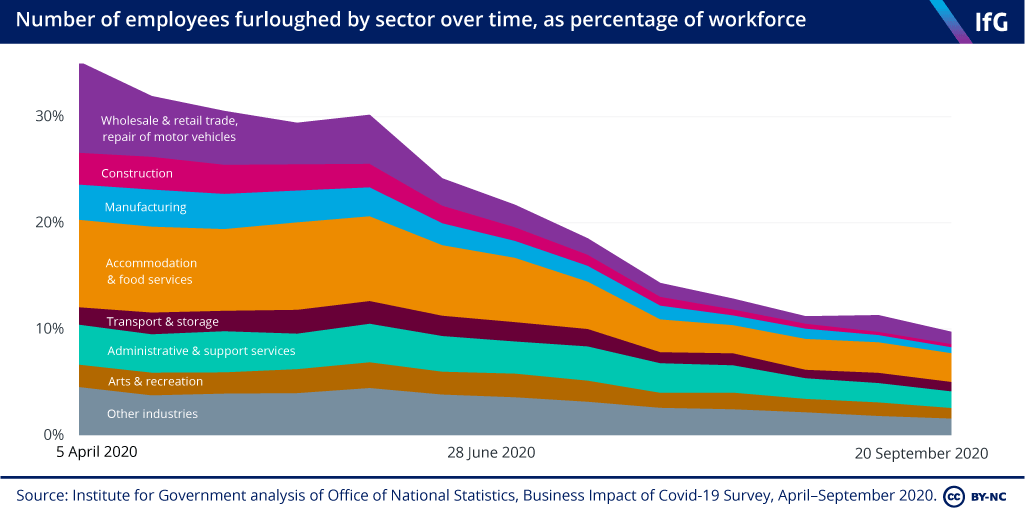How has the furlough scheme has been used? Is the chancellor& #39;s U-turn on the job support scheme sensible?
Tl;dr: changes mean JSS will save viable jobs in affected sectors but prop up jobs with no long term future in other sectors 1/10 https://www.instituteforgovernment.org.uk/publications/coronavirus-job-retention-scheme">https://www.instituteforgovernment.org.uk/publicati...
The furlough scheme has been very successful at its main goal - keeping employer-employee links through the height of the crisis.
Around 7 million people have now left the furlough scheme and most have returned to their old jobs 2/10
Around 7 million people have now left the furlough scheme and most have returned to their old jobs 2/10
That leaves 2-3 million on the furlough scheme in mid-September.
About half of those are in four badly affected sectors: hospitality, arts, administrative and support services and aviation.
Businesses in these sectors are badly affected by social distancing restrictions 3/10
About half of those are in four badly affected sectors: hospitality, arts, administrative and support services and aviation.
Businesses in these sectors are badly affected by social distancing restrictions 3/10
In these badly affected sectors, jobs may have a long-term future even if there is currently no work for people to do: current performance is not a reliable guide to future viability
4/10
4/10
But the other half on the furlough scheme are in sectors less badly affected by public health restrictions. The majority of workers on the scheme aren& #39;t even working part-time. Many of these jobs are likely to be & #39;unviable& #39; - no long-term future. 5/10
One thing to note is that vacancies are still well down on pre-crisis levels, and there are plenty of applicants per vacancy. So no evidence furlough scheme is preventing a big & #39;re-allocation& #39;. 6/10
So what does this mean for the chancellor& #39;s policy? The furlough scheme is now supporting a higher fraction of unviable jobs than earlier in the crisis. So it makes sense to focus on saving & #39;viable& #39; ones - supporting jobs with no long-term future is & #39;deadweight& #39;. 7/10
The old JSS had too stringent a requirement for & #39;viability& #39; for badly affected sectors eg hospitality - would have led to the loss of many jobs with a long-term future.
But it was well designed for recovering sectors where current performance should indicate viability 8/10
But it was well designed for recovering sectors where current performance should indicate viability 8/10
The new more generous JSS is much better for the badly affected sectors, and was designed with them in mind.
But now it will continue to support around one million jobs in relatively unaffected sectors, many of which are likely unviable 9/10
But now it will continue to support around one million jobs in relatively unaffected sectors, many of which are likely unviable 9/10
The answer?
The crisis affects different sectors very differently, so the appropriate approach is a sectoral one:
Generous job support for affected sectors, more stringent tests for the others
10/10
The crisis affects different sectors very differently, so the appropriate approach is a sectoral one:
Generous job support for affected sectors, more stringent tests for the others
10/10
Thanks to all @instituteforgov for getting this out so quickly. Special thanks to co-authors @GrantADalton and @gemmatetlow and the amazing publications team @sammacrory @melissaittoo and Will Driscoll. No thanks to the chancellor for changing policy the day before we published

 Read on Twitter
Read on Twitter





